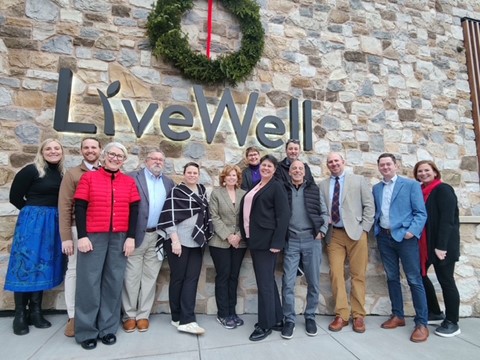
Author:
Kim Warchol, President and Founder of DCS at CPI
Have you ever wondered what your life would be like if you had dementia? Do you fear it? I do. As a woman who is soon saying hello to her 6th decade of life, I find that I both love aging and fear it.
I truly love so much about becoming an elder. I love how I’ve grown spiritually through the years, enabling me to let go of so much that held my younger self back-my personal identities, concerns over what others think, narrow ideas, judgement, etc. With aging, I have grown to be far more peaceful and open to whatever life has to offer, allowing each moment to simply unfold. I am more compassionate, curious, and kind. I do a much better job of living lovingly and gratefully in each precious moment.
And…maybe just maybe, I can admit that I am also a little afraid. I’m afraid of the losses I will likely experience as I age. But really, that’s a non-negotiable, isn’t it? With age comes loss. Loss of loved ones and loss of capabilities are part of the aging landscape. I use my spirituality to help me accept the fact that nothing is permanent.
Losing my parents five weeks apart was devastating and I miss them every day. But our parents passing away before us is to be expected. Another fear is living with illness in my older years. I do what I can to stay healthy and I take a glass half-full approach, but I do wonder, “How would I accept a diagnosis of Alzheimer’s or another dementia, and how would my life change?”
I’ve worked in the dementia field as an Occupational Therapist for over 30 years, and I truly believe we can prevent suffering from dementia, with a compassionate and skilled person-centered, abilities-focused approach. If all care providers, and all of society are dementia capable, I believe we can reduce suffering, in favor of living a life of quality with dementia.
Even though I hold the belief that a person can live well with dementia, I still fear it. Why? I suppose it has something to do with not wanting to be a burden. Who would ever want to become a burden on others? And it has a lot to do with not wanting to lose my precious memories. Who would want to say goodbye to the moments and people from our life that we hold most dear? And how would I feel when everything becomes unfamiliar, and everyone becomes a stranger? Daunting thoughts indeed.
But facing fear can be a good thing. What opens for us when we feel this fear? How does our choice to plunge ourselves into fear instead of avoiding it, become helpful? For me this wondering of “what-if” builds even greater tenacity to create a dementia capable workforce and society. This is because I know through my many years of working in dementia care, the experience someone has with dementia can be very dependent upon the people that surround and support them.
So, I suggest we all take a moment to sit with the question. Ask yourself, “What would life be like if I had dementia?” Perhaps the answers that come in silent reflection are heartfelt and lead us to grace. Perhaps we will live each day more gratefully. And perhaps, through our deeper understanding of what living with dementia could feel like, we become more kind and compassionate to those living with dementia and their loved ones.
Digging in and facing our fears can have a profound positive impact. I hope our fear of being diagnosed with dementia helps us to become a little more patient and helpful to the person we stand behind in line who is struggling to figure out how to use the keypad. I hope our fear helps us to patiently answer repeated questions again, and again. I hope our fear encourages us to learn everything we can to become a competent dementia capable care partner and to extend love and compassion to all who need it most.
Gain the knowledge and skills to optimize function, safety, and quality of life for those you serve and certifications to distinguish yourself or your organization as a leader
Share This Post:
Tell Me More!
Learn how our solutions can benefit you or
your organization.
Continue Learning:



